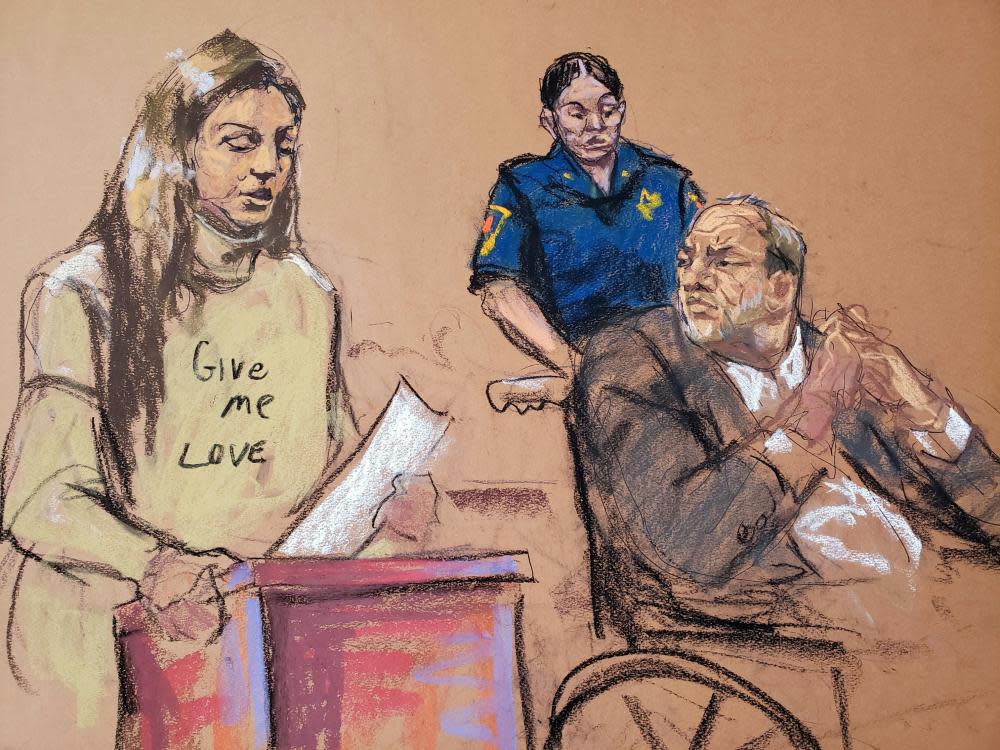Harvey Weinstein bewildered as women he abused have their say

The six women who testified against the former Hollywood movie mogul Harvey Weinstein filed into the packed Manhattan courtroom to witness his sentencing as a convicted sex offender. The room buzzed with anticipation as they took their seats next to each other at the front.
Weinstein, now a convicted rapist, was soon rolled into the room in a wheelchair, his handcuffs removed by a court officer for the hearing. Before Judge James Burke delivered his sentence, Weinstein spoke for the first time during the court’s session, pleading for leniency.
Related: Jennifer Aniston 'should be killed': Weinstein's rage laid bare in unsealed court documents
Appearing to speak extemporaneously, he fell short of an apology. He said, “I have remorse for all of you,” referring to the six women who were sitting just a few feet away, but continually referred to the philanthropic contributions he had made during his career, and the Hollywood figures who had found success after his training.
Any remorse appeared short-lived. Weinstein, whose deep, rough voice sounded strained and soft in the courtroom, said “the [#MeToo] movement started basically because of me,” adding: “I was the first example and now there are thousands of men who are being accused.”
“I’m worried about this country,” he said, saying there are “thousands of men and women who are losing due process” after being accused. “I’m totally confused. I think men are confused about these issues.”
But before delivering his sentence, Burke noted: “There is evidence before of other incidents of sexual assaults involving a number of women that is of legitimate consideration for this sentence.”
Then, the sentences fell. There were audible gasps when the judge said Weinstein will serve 20 years for a first-degree criminal sexual act of forcing oral sex on a production assistant, Miriam Haley, in 2006. He also imposed a three-year sentence for the third-degree rape of a woman whom the Guardian is not naming because her wishes over identification are not clear. The women at the front of the room appeared to break down in tears.
Given that the maximum sentence for his crimes would have been 29 years, it appears the judge was swayed by the prosecution’s final case.
Lead prosecutor Joan Illuzzi-Orbon opened the session by painting one last sketch of Weinstein as a powerful abuser who had no regrets about destroying his victims.
She noted that Weinstein was valued in an industry that is known for its glamour and its ability to entertain people and allow them to momentarily escape through movies. “It becomes a dream for many people to be part of that world,” Illuzzi-Orbon said.
Weinstein “had that dream come true”, she said. “He enjoyed the wealth, had the resources … he held the dreams of many people in their hands.
“How did he use that power? He got drunk on that power,” she said, her voice vibrating in the courtroom. “He held all the cards and played them at will.”
Without his conviction, Weinstein “would never have been stopped from hurting and destroying more lives”, Illuzzi-Orbon said, adding that the women who testified “sacrificed their privacy and, at times, their wellbeing” to ensure that.
Illuzzi-Orbon also reflected on the severity of sexual assault as a crime, defining it for the judge and emphasizing its violent and humiliating nature. “It cuts through your soul, yet the defendant did it without hesitation, without thought – he did it to one and moved on to another.”
Weinstein’s two main accusers were allowed to give victim statements, allowing the judge to hear directly the impact the crime had on them and why he should get the maximum sentence.
Haley praised the jury’s decision to convict Weinstein. “I believe there are women who are safer because he’s not out there,” she said.
She emphasized that the assault “stripped me of my dignity as a human being and as a woman”, adding that it diminished her confidence, caused her confusion and distress and was embarrassing and hurtful.
She ended by saying she noticed a lack of remorse in Weinstein, and asked the judge for a sentence that is “long enough for Harvey Weinstein to acknowledge what he’s done to me and others to be truly sorry”.
The second main accuser, who Weinstein was accused of raping in the third degree in 2013, breathlessly delivered her statement to the judge, asking him to understand the complicated nature of sexual assault and how survivors behave afterwards.
She described the phenomenon of “rape paralysis”, when a rape victim does not react to an assault, frozen out of fear. “A good visual of this is when animals play dead under stress,” she said. “When [Weinstein] pleasured himself inside of my body, I wish I was able to fight.”
She noted that her “rape was preventable” as Weinstein’s abuse was known by the time he assaulted her in 2013, but he only got “slaps on the wrist”.
“He is baffled at finally being held accountable,” she said.
She appeared to be shaking at times, but her voice was firm as she poured out her statement. “The impact of rape is profound. I live in a body that feels unsafe,” she said. “I am forced to carry that experience until I die.”
She assured the judge and the courtroom that she had no shame for coming forward about her complex relationship with Weinstein and believed her case could help other survivors in the future. “I have found my voice, and together we can have a future where monsters no longer hide in the closet.”

